Politics
Kamala Harris: Everything you need to know

Kamala Harris’ life has been filled with milestones.
Her elementary school class in the 1970s was the second one to integrate Berkeley schools.
Harris was the first woman elected as San Francisco’s district attorney.
She was the first woman to be elected as California’s attorney general.
She was the first person of color to be elected to the U.S. Senate from California.
She was first woman elected vice president of the United States.
Now, with President Biden announcing Sunday that he will step aside as the Democratic presidential nominee and endorsing Harris, she is close to becoming the party’s Democratic nominee for president.
The Times has been covering Harris extensively for two decades. Here is an overview of her story from our pages.
President Biden listens as Vice President Kamala Harris speaks.
(Susan Walsh / Associated Press)
California roots
From Oakland to Canada and back, with inspiration from India
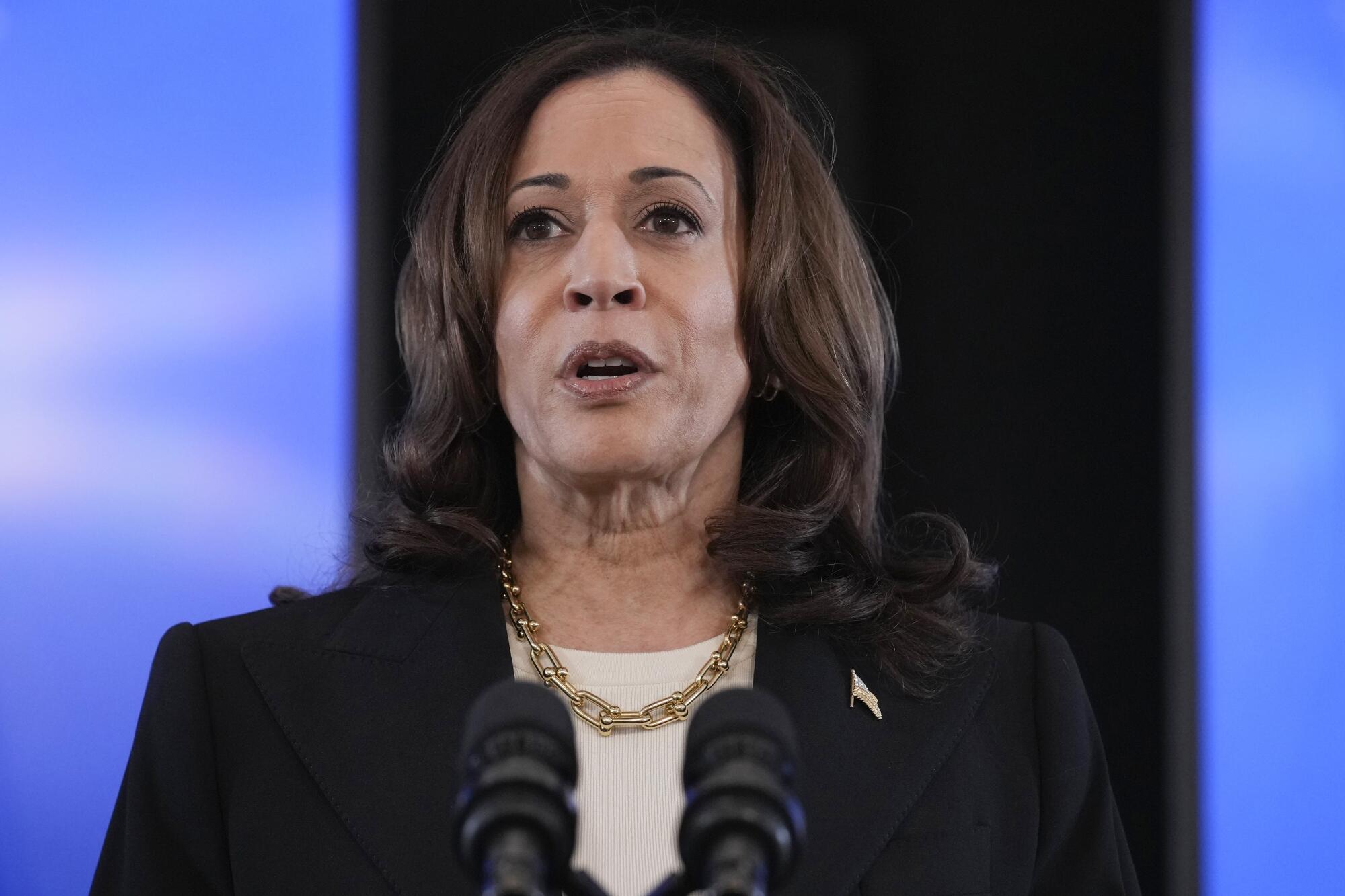
Vice President Kamala Harris speaks about sexual violence.
(Susan Walsh / Associated Press)
Political beginnings
A prosecutor with an ambition for Bay Area politics
- Harris got her start in Bay Area politics and law enforcement. She prosecuted murder, rape, assault and drug cases at the Alameda County district attorney’s office in Oakland from 1990-98.
- San Francisco Dist. Atty. Terence Hallinan had hired Harris in 1998 to lead his career-criminal unit. She ended up running against him and winning in 2003. The campaign was bruising, with critics citing her relationship with San Francisco’s colorful and controversial Mayor Willie Brown. Her record as a prosecutor included some progressive policies but other ones that critics would later say were too “tough on crime.”
-
In 2010, Harris moved to statewide politics, defeating Republican Steve Cooley for attorney general.
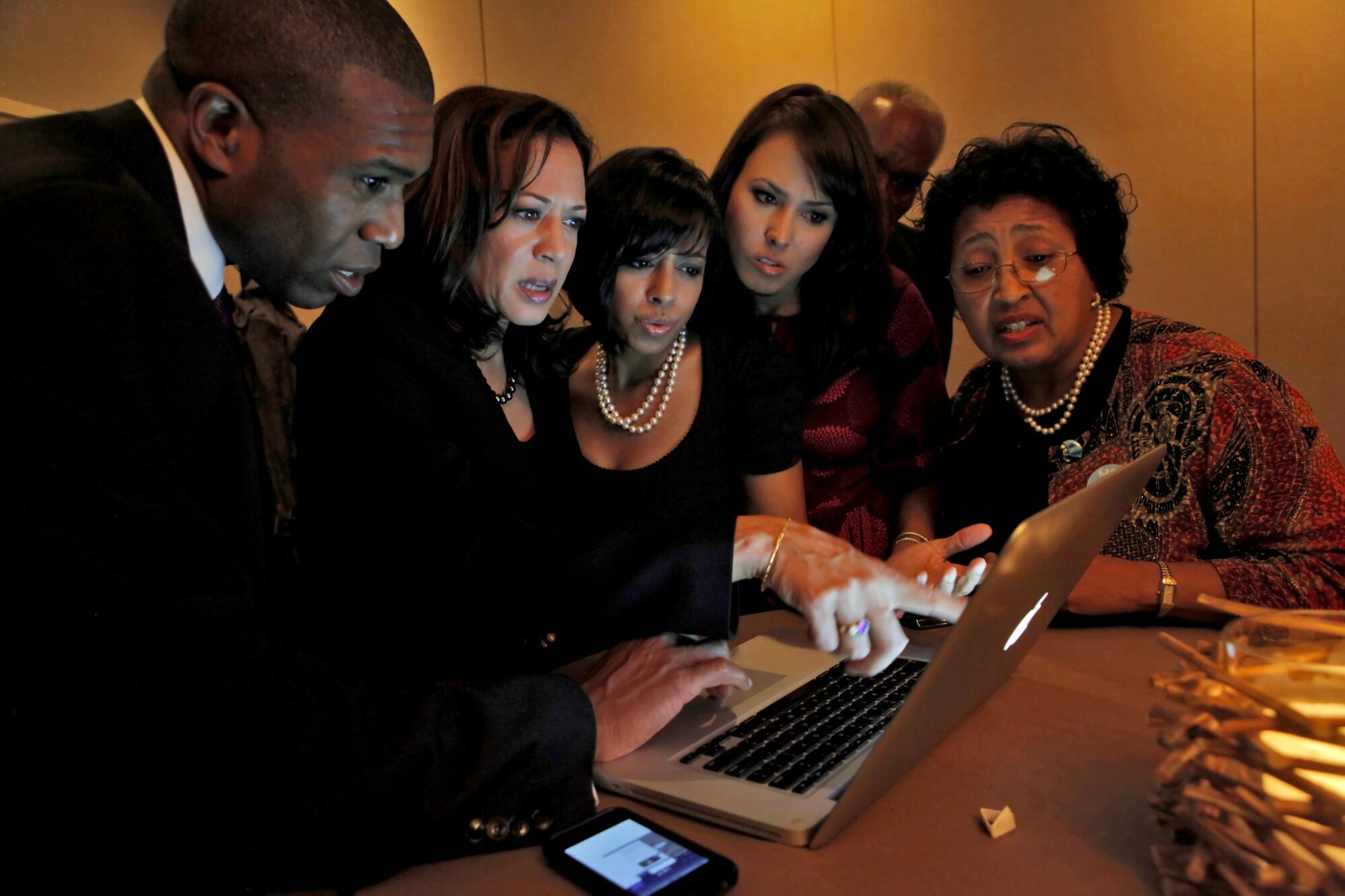
Tony West, left, and Kamala Harris look up the poll results with family Maya Harris, Meena Harris and parents Frank and Peggy Harris on Nov. 2, 2010, in San Francisco.
(San Francisco Chronicle/Hearst N/Hearst Newspapers via Getty Imag)
- As attorney general, she started implicit-bias training for law enforcement, and as district attorney she launched a program that enabled first-time nonviolent offenders to get their charges dismissed if they finished job training. Critics have faulted her, though, for working in court to uphold California’s death penalty, despite her personal opposition, and for her threats to jail parents of chronically truant schoolchildren.
In 2016 The Times editorial board praised Harris for being willing to stand up to the little guy as attorney general. AG. But it issued this warning: “Harris has at times seemed more focused on her political career than on the job she was elected to do. She has been too cautious and unwilling to stake out a position on controversial issues, even when her voice would have been valuable to the debate.” - Harris got national attention for her efforts to have courts overturn California’s ban on gay marriage and allow same-sex couples to legally marry.
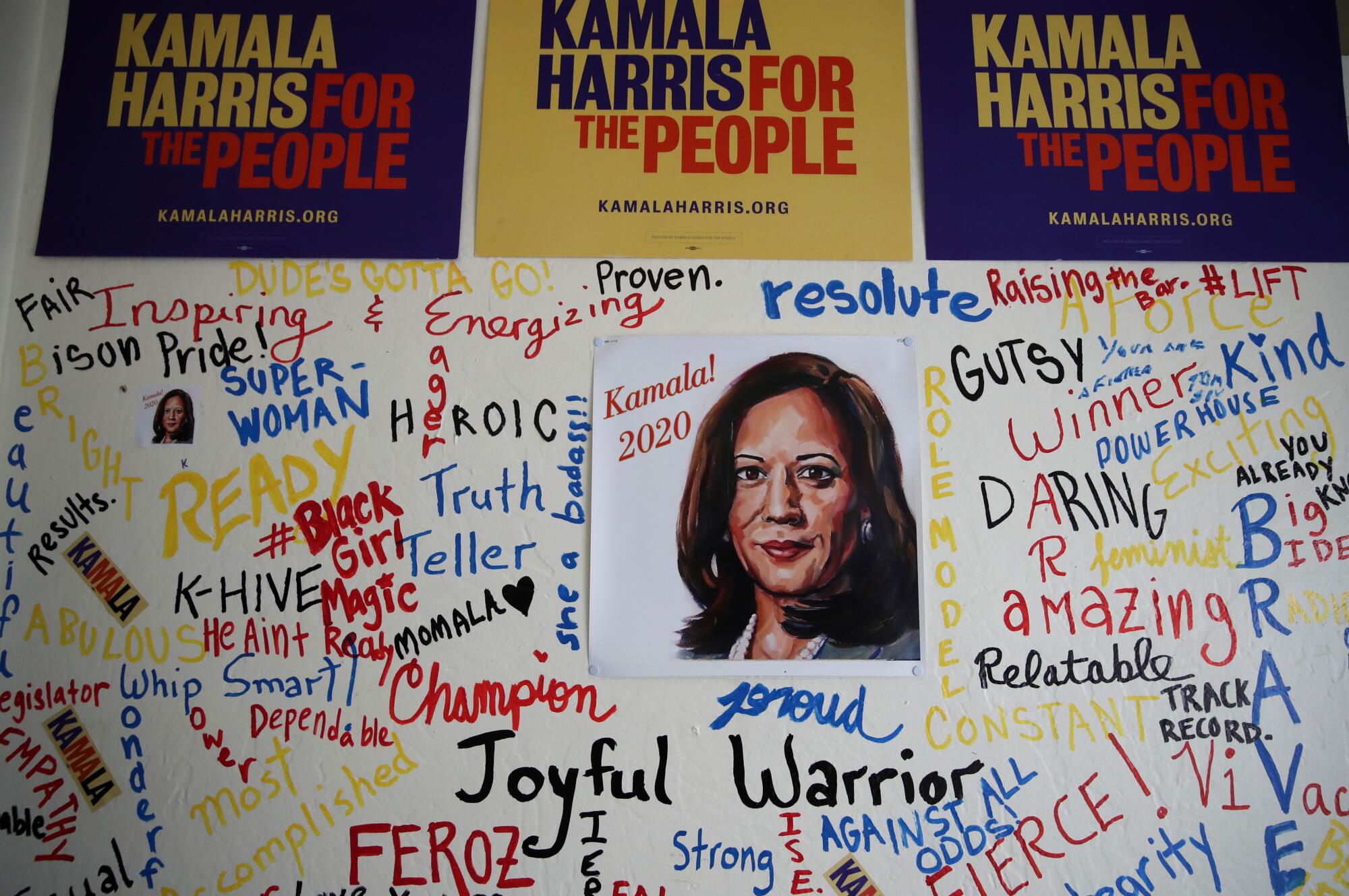
A picture of Kamala Harris at an Oakland campaign office in 2019.
(Justin Sullivan/Getty Images)
National stage
Breaking barriers with a rise to Washington
- Her next move was the 2016 race to replace the retiring Barbara Boxer as U.S. senator. With Democrats dominant in California, it came down to a history-making battle between her and Southern California’s Loretta Sanchez. When Harris won, The Times declared that she tore “down a color barrier that has stood for as long as California statehood.”
- In 2019, she began her campaign for U.S. president. Early on she built strong momentum, drawing a crowd of roughly 20,000 to a lavish Oakland rally. She raised $1.5 million in just 24 hours. She boasted a string of endorsements from California politicians.
- But her campaign slowly sputtered. As The Times reported in March 2019, the fall “stems in part from Harris’ failure to present a compelling case for her candidacy beyond her background as a prosecutor, her buoyant personality and a deep contempt — shared by others in the contest — for President Trump.”
- In December, she suspended her campaign. The Times called it a “lackluster end to an initially soaring presidential bid premised on the California senator’s personal biography and prosecutorial acumen. Ultimately, her run foundered with a muddled purpose, campaign infighting and an inability to sustain support from vital Democratic voting blocs, particularly African Americans.”
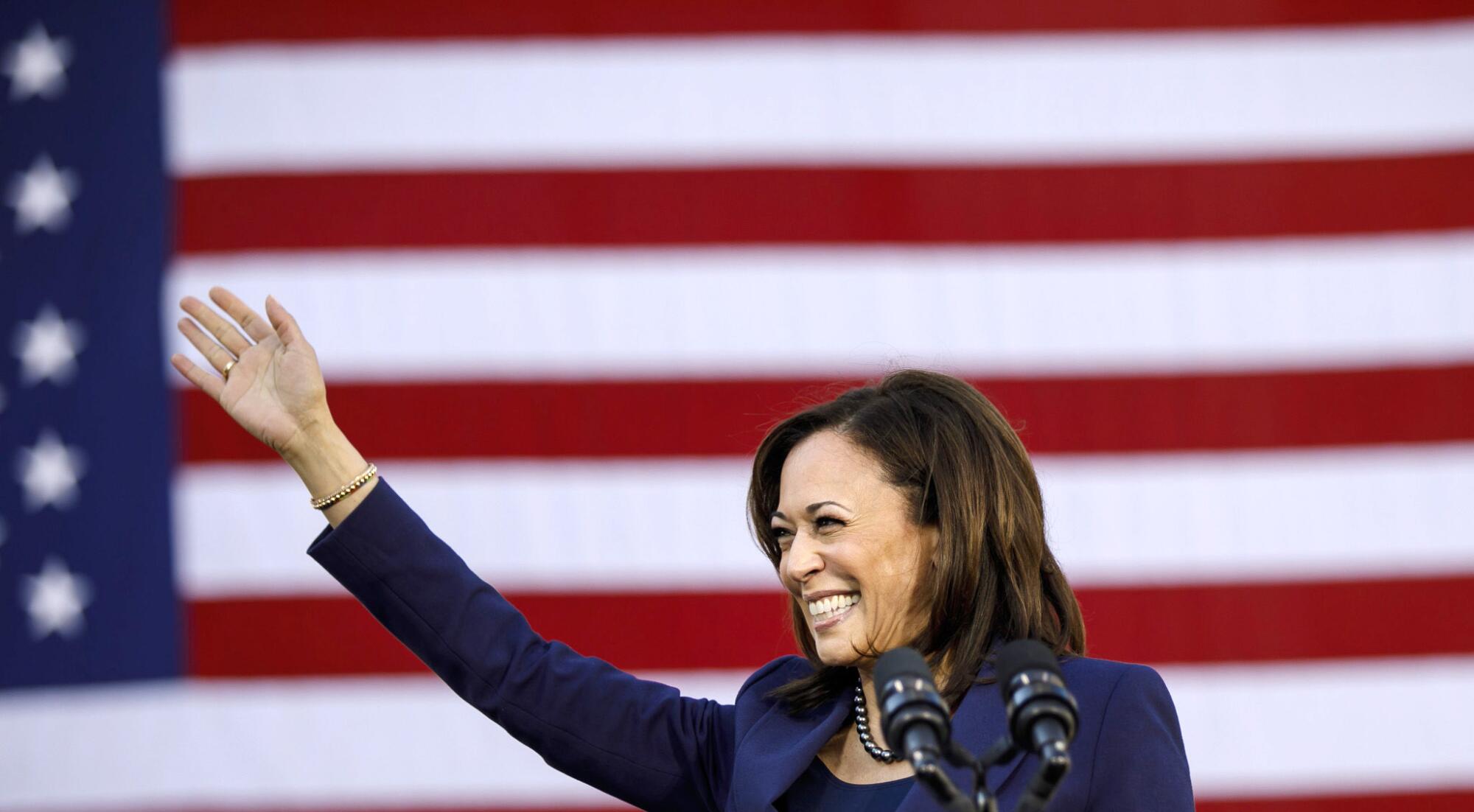
Sen. Kamala Harris kick-starts her presidential campaign at a rally in her hometown of Oakland on Jan. 27, 2019.
(Marcus Yam/Los Angeles Times)
- Biden locked in the nomination, but there was no guarantee he would pick her as his running mate. Some felt the Biden team was angry at her treatment of him during the campaign. But Biden ended up selecting Harris. The Times said at the time: “In many ways, Harris is a safe pick — broadly popular in the Democratic Party and well acquainted with the rigors of a national campaign. But her selection also carries symbolic heft in this moment when race relations are at top of mind for voters.”
- Harris held her own during her debate with Vice President Mike Pence and serving as an effective surrogate. The Times reported “Those who have spoken with Harris say she sees the changes — in style, in her approach to campaigning, in the faces surrounding her — worth the goals she now pursues: replacing Trump with Biden and becoming the first female vice president in history.”
- Harris was elected as the nation’s first female vice president (and first person of color to be vice president) in November 2020.
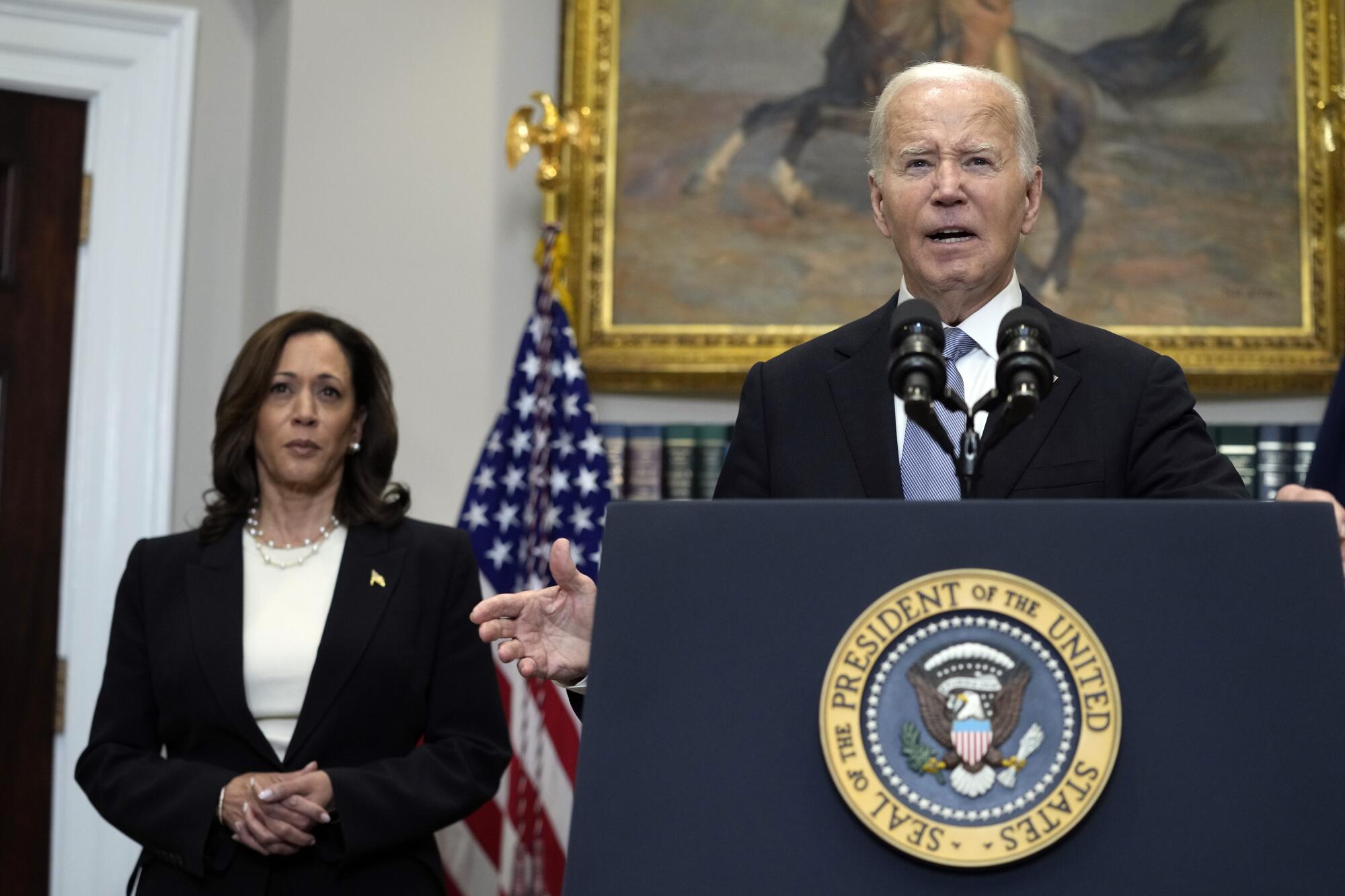
President Biden speaks from the Roosevelt Room earlier this month with Kamala Harris beside him.
(Susan Walsh / Associated Press)
Vice president
Struggling to find her footing in a big job
- Harris made history when she took office, but her term has been marked by successes and struggles.
- After her first year in office, The Times offered this assessment: “Harris has struggled to tell her own story, leaving others to fill the void. Conservative media have attacked her while mainstream outlets have published a string of stories about low morale and high staff turnover in her office. Like many vice presidents, Harris is learning how hard it is to define herself as a No. 2.
- She was handed a difficult assignment in those early months: Leading diplomatic efforts to curb migration from Central America. There were early controversies, such as when she told would-be immigrants not to come to the United States. As the immigration issue has become hot in the 2024 race, Harris faces tough questions about her role in Biden policies.
- Democrats worried about Harris’ lackluster poll numbers as they considered a leader of the party after Biden. “Harris has become a source of tension among Democrats, as growing worries over Harris’ political stature collide with concerns that any move to sideline her would alienate the voters needed to win elections and undercut the party’s promise of equity,” The Times wrote in 2021.
Some fear Harris was shrinking in the job. “Caution has long been a hallmark of Harris’ political career, and the subservient nature of the vice presidency, as well as the scrutiny of Biden loyalists sensitive to the merest hint of personal ambition, reinforce that inclination,” Times columnist Mark Z. Barabak wrote in 2021. - After the Supreme Court struck down Roe vs. Wade, Harris emerged as a leading voice in protecting reproductive rights.
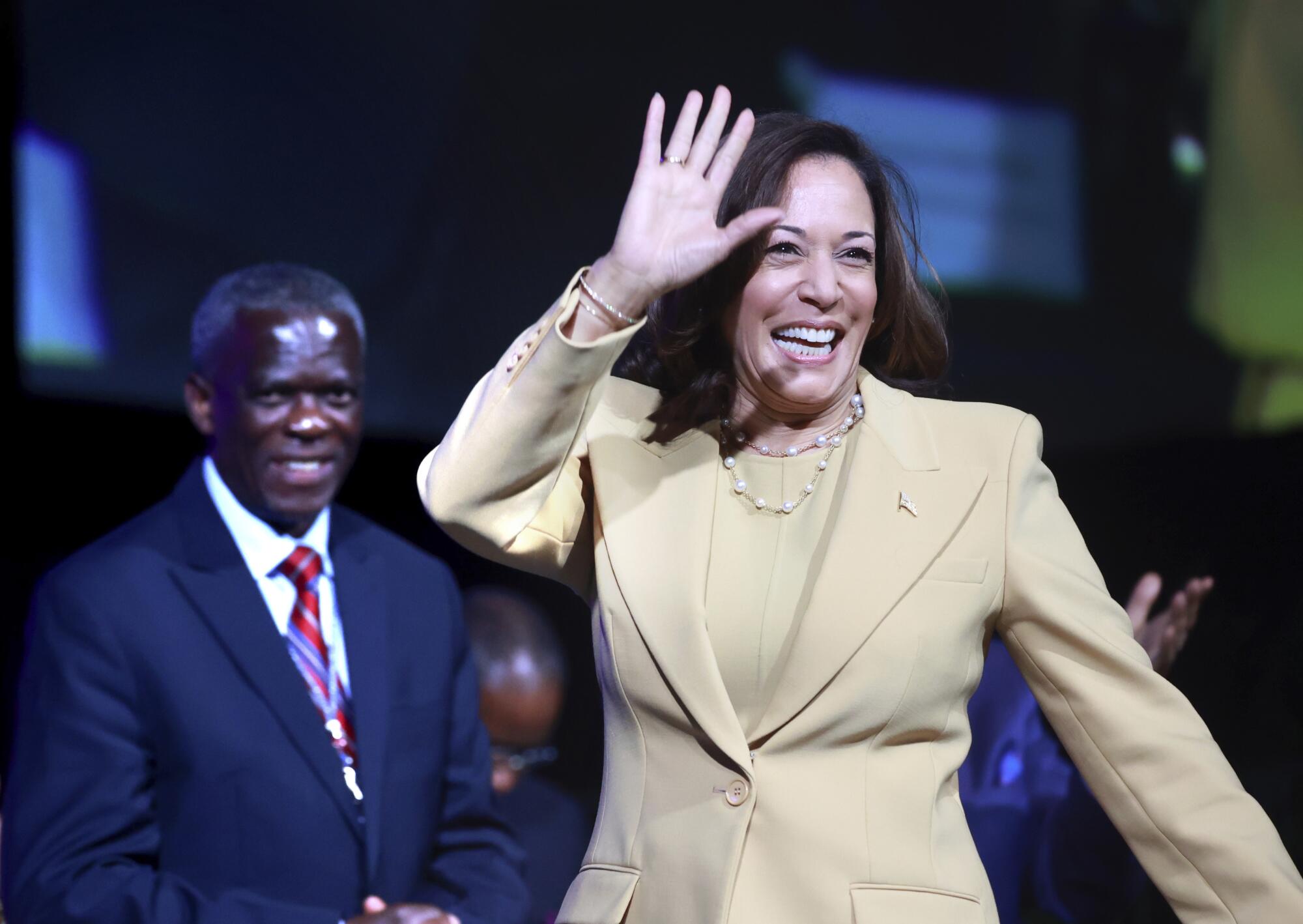
Vice President Kamala Harris takes the stage in Orlando, Fla., at the 20th Quadrennial Convention of the Women’s Missionary Society of the African Methodist Episcopal (AME) Church on Aug. 1, 2023.
(Joe Burbank / Associated Press)
- Barabak in early 2024 rated her this way: “Harris finally seems to have found her footing in a role to which she is accustomed and adept: prosecuting attorney.”
- Harris has endured unprecedented levels of hate on social media. “Research shows that Harris may be the most targeted American politician on the internet, one who checks every box for the haters of the fever swamps: She’s a woman, she’s a person of color and she holds power,” The Times found.
- Before Biden’s disastrous debate performance, Harris was still struggling to present herself as a successor. “More than three years into the oldest president in history’s first term, his understudy has failed to win over a majority of voters or convince them that she is ready to step in if Biden falters, according to polls,” The Times reported in April.
- Harris’ star rose as Democrats began to call on Biden to step aside and end his reelection campaign. She had remained publicly supportive of Biden, even as calls for her to replace him at the head of the ticket grew louder.

Politics
Video: Bill Clinton Says He ‘Did Nothing Wrong’ in House Epstein Inquiry

new video loaded: Bill Clinton Says He ‘Did Nothing Wrong’ in House Epstein Inquiry
transcript
transcript
Bill Clinton Says He ‘Did Nothing Wrong’ in House Epstein Inquiry
Former President Bill Clinton told members of the House Oversight Committee in a closed-door deposition that he “saw nothing” and had done nothing wrong when he associated with Jeffrey Epstein decades ago.
-
“Cause we don’t know when the video will be out. I don’t know when the transcript will be out. We’ve asked that they be out as quickly as possible.” “I don’t like seeing him deposed, but they certainly went after me a lot more than that.” “Republicans have now set a new precedent, which is to bring in presidents and former presidents to testify. So we’re once again going to make that call that we did yesterday. We are now asking and demanding that President Trump officially come in and testify in front of the Oversight Committee.” “Ranking Member Garcia asked President Clinton, quote, ‘Should President Trump be called to answer questions from this committee?’ And President Clinton said, that’s for you to decide. And the president went on to say that the President Trump has never said anything to me to make me think he was involved. “The way Chairman Comer described it, I don’t think is a complete, accurate description of what actually was said. So let’s release the full transcript.”

By Jackeline Luna
February 27, 2026
Politics
ICE blasts Washington mayor over directive restricting immigration enforcement

NEWYou can now listen to Fox News articles!
U.S. Immigration and Customs Enforcement (ICE) accused Everett, Washington, Mayor Cassie Franklin of escalating tensions with federal authorities after she issued a directive limiting immigration enforcement in the city.
Franklin issued a mayoral directive this week establishing citywide protocols for staff, including law enforcement, that restrict federal immigration agents from entering non-public areas of city buildings without a judicial warrant.
“We’ve heard directly from residents who are afraid to leave their houses because of the concerning immigration activity happening locally and across our country. It’s heartbreaking to see the impacts on Everett families and businesses,” Franklin said in a statement.
“With this directive, we are setting clear protocols, protecting access to services and reinforcing our commitment to serving the entire community.”
ICE blasted the directive Friday, writing on X it “escalates tension and directs city law enforcement to intervene with ICE operations at their own discretion,” thereby “putting everyone at greater risk.”
Mayor Cassie Franklin said her new citywide immigration enforcement protocols are intended to protect residents and ensure access to services, while ICE accused her of escalating tensions with federal authorities. (Google Maps)
ICE said Franklin was directing city workers to “impede ICE operations and expose the location of ICE officers and agents.”
“Working AGAINST ICE forces federal teams into the community searching for criminal illegal aliens released from local jails — INCREASING THE FEDERAL PRESENCE,” the agency said. “Working with ICE reduces the federal presence.”
“If Mayor Franklin wanted to protect the people she claims to serve, she’d empower the city police with an ICE 287g partnership — instead she serves criminal illegal aliens,” ICE added.
DHS, WHITE HOUSE MOCK CHICAGO’S LAWSUIT OVER ICE: ‘MIRACULOUSLY REDISCOVERED THE 10TH AMENDMENT’
U.S. Immigration and Customs Enforcement blasted Everett’s mayor after she issued a directive restricting federal agents from accessing non-public areas of city facilities without a warrant. (Victor J. Blue/Bloomberg via Getty Images)
During a city council meeting where she announced the policy, Franklin said “federal immigration enforcement is causing real fear for Everett residents.”
“It’s been heartbreaking to see the racial profiling that’s having an impact on Everett families and businesses,” she said. “We know there are kids staying home from school, people not going to work or people not going about their day, dining out or shopping for essentials.”
The mayor’s directive covers four main areas, including restricting federal immigration agents from accessing non-public areas of city buildings without a warrant, requiring immediate reporting of enforcement activity on city property and mandating clear signage to enforce access limits.
BLOCKING ICE COOPERATION FUELED MINNESOTA UNREST, OFFICIALS WARN AS VIRGINIA REVERSES COURSE
Everett, Wash., Mayor Cassie Franklin said her new directive is aimed at protecting residents amid heightened immigration enforcement activity. (iStock)
It also calls for an internal policy review and staff training, including the creation of an Interdepartmental Response Team and updated immigration enforcement protocols to ensure compliance with state law.
Franklin directed city staff to expand partnerships with community leaders, advocacy groups and regional governments to coordinate responses to immigration enforcement, while promoting immigrant-owned businesses and providing workplace protections and “know your rights” resources.
The mayor also reaffirmed a commitment to “constitutional policing and best practices,” stating that the police department will comply with state law barring participation in civil immigration enforcement. The directive outlines protocols for documenting interactions with federal officials, reviewing records requests and strengthening privacy safeguards and technology audits.
CLICK HERE TO DOWNLOAD THE FOX NEWS APP
Everett, Wash., Mayor Cassie Franklin issued a directive limiting federal immigration enforcement in city facilities. (iStock)
“We want everyone in the city of Everett to feel safe calling 911 when they need help and to know that Everett Police will not ask about your immigration status,” Franklin said during the council meeting. ”I also expect our officers to intervene if it’s safe to do so to protect our residents when they witness federal officers using unnecessary force.”
Fox News Digital has reached out to Mayor Franklin’s office and ICE for comment.
Politics
Power, politics and a $2.8-billion exit: How Paramount topped Netflix to win Warner Bros.

The morning after Netflix clinched its deal to buy Warner Bros., Paramount Skydance Chairman David Ellison assembled a war room of trusted advisors, including his billionaire father, Larry Ellison.
Furious at Warner Bros. Discovery Chief David Zaslav for ending the auction, the Ellisons and their team began plotting their comeback on that crisp December day.
To rattle Warner Bros. Discovery and its investors, they launched a three-front campaign: a lawsuit, a hostile takeover bid and direct lobbying of the Trump administration and Republicans in Congress.
“There was a master battle plan — and it was extremely disciplined,” said one auction insider who was not authorized to comment publicly.
Netflix stunned the industry late Thursday by pulling out of the bidding, clearing the way for Paramount to claim the company that owns HBO, HBO Max, CNN, TBS, Food Network and the Warner Bros. film and television studios in Burbank. The deal was valued at more than $111 billion.
The streaming giant’s reversal came just hours after co-Chief Executive Ted Sarandos met with Atty Gen. Pam Bondi and a deputy at the White House. It was a cordial session, but the Trump officials told Sarandos that his deal was facing significant hurdles in Washington, according to a person close to the administration who was not authorized to comment publicly.
Even before that meeting, the tide had turned for Paramount in a swell of power, politics and brinkmanship.
“Netflix played their cards well; however, Paramount played their cards perfectly,” said Jonathan Miller, chief executive of Integrated Media Co. “They did exactly what they had to do and when they had to do it — which was at the very last moment.”
Key to victory was Larry Ellison, his $200-billion fortune and his connections to President Trump and congressional Republicans.
Paramount also hired Trump’s former antitrust chief, attorney Makan Delrahim, to quarterback the firm’s legal and regulatory action.
Republicans during a Senate hearing this month piled onto Sarandos with complaints about potential monopolistic practices and “woke” programming.
David Ellison skipped that hearing. This week, however, he attended Trump’s State of the Union address in the Capitol chambers, a guest of Sen. Lindsey Graham (R-S.C.). The two men posed, grinning and giving a thumbs-up, for a photo that was posted to Graham’s X account.
David Ellison, the chairman and chief executive of Paramount Skydance Corp., walks through Statuary Hall to the State of the Union address at the U.S. Capitol on Feb. 24, 2026.
(Anna Moneymaker / Getty Images)
On Friday, Netflix said it had received a $2.8-billion payment — a termination fee Paramount agreed to pay to send Netflix on its way.
Long before David Ellison and his family acquired Paramount and CBS last summer, the 43-year-old tech scion and aircraft pilot already had his sights set on Warner Bros. Discovery.
Paramount’s assets, including MTV, Nickelodeon and the Melrose Avenue movie studio, have been fading. Ellison recognized he needed the more robust company — Warner Bros. Discovery — to achieve his ambitions.
“From the very beginning, our pursuit of Warner Bros. Discovery has been guided by a clear purpose: to honor the legacy of two iconic companies while accelerating our vision of building a next-generation media and entertainment company,” David Ellison said in a Friday statement. “We couldn’t be more excited for what’s ahead.”
Warner’s chief, Zaslav, who had initially opposed the Paramount bid, added: “We look forward to working with Paramount to complete this historic transaction.”
Netflix, in a separate statement, said it was unwilling to go beyond its $82.7-billion proposal that Warner board members accepted Dec. 4.
“We believe we would have been strong stewards of Warner Bros.’ iconic brands, and that our deal would have strengthened the entertainment industry and preserved and created more production jobs,” Sarandos and co-Chief Executive Greg Peters said in a statement.
“But this transaction was always a ‘nice to have’ at the right price, not a ‘must have’ at any price,” the Netflix chiefs said.
Netflix may have miscalculated the Ellison family’s determination when it agreed Feb. 16 to allow Paramount back into the bidding.
The Los Gatos, Calif.-based company already had prevailed in the auction, and had an agreement in hand. Its next step was a shareholder vote.
“They didn’t need to let Paramount back in, but there was a lot of pressure on them to make sure the process wouldn’t be challenged,” Miller said.
In addition, Netflix’s stock had also been pummeled — the company had lost a quarter of its value — since investors learned the company was making a Warner run.
Upon news that Netflix had withdrawn, its shares soared Friday nearly 14% to $96.24.

Netflix Chief Executive Ted Sarandos arrives at the White House on Feb. 26, 2026.
(Andrew Leyden / Getty Images)
Invited back into the auction room, Paramount unveiled a much stronger proposal than the one it submitted in December.
The elder Ellison had pledged to personally guarantee the deal, including $45.7 billion in equity required to close the transaction. And if bankers became worried that Paramount was too leveraged, the tech mogul agreed to put in more money in order to secure the bank financing.
That promise assuaged Warner Bros. Discovery board members who had fretted for weeks that they weren’t sure Ellison would sign on the dotted line, according to two people close to the auction who were not authorized to comment.
Paramount’s pressure campaign had been relentless, first winning over theater owners, who expressed alarm over Netflix’s business model that encourages consumers to watch movies in their homes.
During the last two weeks, Sarandos got dragged into two ugly controversies.
First, famed filmmaker James Cameron endorsed Paramount, saying a Netflix takeover would lead to massive job losses in the entertainment industry, which is already reeling from a production slowdown in Southern California that has disrupted the lives of thousands of film industry workers.
Then, a week ago, Trump took aim at Netflix board member Susan Rice, a former high-level Obama and Biden administration official. In a social media post, Trump called Rice a “no talent … political hack,” and said that Netflix must fire her or “pay the consequences.”
The threat underscored the dicey environment for Netflix.
Additionally, Paramount had sowed doubts about Netflix among lawmakers, regulators, Warner investors and ultimately the Warner board.
Paramount assured Warner board members that it had a clear path to win regulatory approval so the deal would quickly be finalized. In a show of confidence, Delrahim filed to win the Justice Department’s blessing in December — even though Paramount didn’t have a deal.
This month, a deadline for the Justice Department to raise issues with Paramount’s proposed Warner takeover passed without comment from the Trump regulators.
“Analysts believe the deal is likely to close,” TD Cowen analysts said in a Friday report. “While Paramount-WBD does present material antitrust risks (higher pay TV prices, lower pay for TV/movie workers), analysts also see a key pro-competitive effect: improved competition in streaming, with Paramount+ and HBO Max representing a materially stronger counterweight to #1 Netflix.”
Throughout the battle, David Ellison relied on support from his father, attorney Delrahim, and three key board members: Oracle Executive Vice Chair Safra A. Catz; RedBird Capital Partners founder Gerry Cardinale; and Justin Hamill, managing director of tech investment firm Silver Lake.
In the final days, David Ellison led an effort to flip Warner board members who had firmly supported Netflix. With Paramount’s improved offer, several began leaning toward the Paramount deal.
On Tuesday, Warner announced that Paramount’s deal was promising.
On Thursday, Warner’s board determined Paramount’s deal had topped Netflix. That’s when Netflix surrendered.
“Paramount had a fulsome, 360-degree approach,” Miller said. “They approached it financially. … They understood the regulatory environment here and abroad in the EU. And they had a game plan for every aspect.”
On Friday, Paramount shares rose 21% to $13.51.
It was a reversal of fortunes for David Ellison, who appeared on CNBC just three days after that war room meeting in December.
“We put the company in play,” David Ellison told the CNBC anchor that day. “We’re really here to finish what we started.”
Times staff writer Ana Cabellos and Business Editor Richard Verrier contributed to this report.
-

 World2 days ago
World2 days agoExclusive: DeepSeek withholds latest AI model from US chipmakers including Nvidia, sources say
-

 Massachusetts3 days ago
Massachusetts3 days agoMother and daughter injured in Taunton house explosion
-

 Montana1 week ago
Montana1 week ago2026 MHSA Montana Wrestling State Championship Brackets And Results – FloWrestling
-

 Louisiana5 days ago
Louisiana5 days agoWildfire near Gum Swamp Road in Livingston Parish now under control; more than 200 acres burned
-

 Denver, CO2 days ago
Denver, CO2 days ago10 acres charred, 5 injured in Thornton grass fire, evacuation orders lifted
-

 Technology7 days ago
Technology7 days agoYouTube TV billing scam emails are hitting inboxes
-

 Technology7 days ago
Technology7 days agoStellantis is in a crisis of its own making
-

 Politics7 days ago
Politics7 days agoOpenAI didn’t contact police despite employees flagging mass shooter’s concerning chatbot interactions: REPORT

















